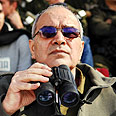

IDF war probe: Halutz should have spent more time at front
Maj. Gen. Udi Shani (res) completes internal investigation in to wartime failings, says chief of staff during Second Lebanon War ignored dissenting views among top commanders, chose to stay behind at military headquarters when he should have been on front lines
The Israeli military failed in its 2006 war against Lebanon's Hizbullah guerrillas because the top commanders didn't operate and communicate properly, and were late in preparing for a ground offensive, an ex-general said Saturday, after conducting an internal investigation.
The reserve general, Udi Shani, also said that the army chief at the time, Lt. Gen. Dan Halutz, wasn't receptive enough to dissenting views among top commanders and should have spent more time near the front lines, rather than at military headquarters.
''The military failed,'' Shani told Israel Radio. ''It didn't operate properly.''
''The military failed because it had an erroneous concept,'' he said, in an apparent reference to the heavy reliance on air strikes against Hizbullah.
The unusually frank criticism of the army command came just days after a five-member investigative panel, headed by retired Judge Eliyahu Winograd, issued its final report on the 34-day war, criticizing both the government and the army for ''serious failings and flaws.''
Winograd said Israel did not win the war and the army did not provide an effective response to a sustained, deadly barrage of rocket fire from Hizbullah guerrillas. Despite a heavy Israeli aerial campaign, the guerrilla group rained nearly 4,000 rockets on northern Israel. Israeli reservists returning from the battlefield complained of poor training and a lack of ammunition and key supplies.
In parallel, Shani conducted an internal army investigation of the performance of the top command.
He said the reliance on air attacks was reasonable in the first few days of the war, but that commanders then should have prepared for a ground offensive.
The military only embarked on the ground offensive at the last minute, just as a UN truce was about to
take effect. More than 30 Israeli soldiers were killed in that fighting.
Winograd said the 11th-hour offensive failed in its mission, did not improve Israel's position and that the army was not prepared for it. However, he said the operation's goals were legitimate.
Most of the army's wartime commanders, including Halutz, have resigned since the war.















